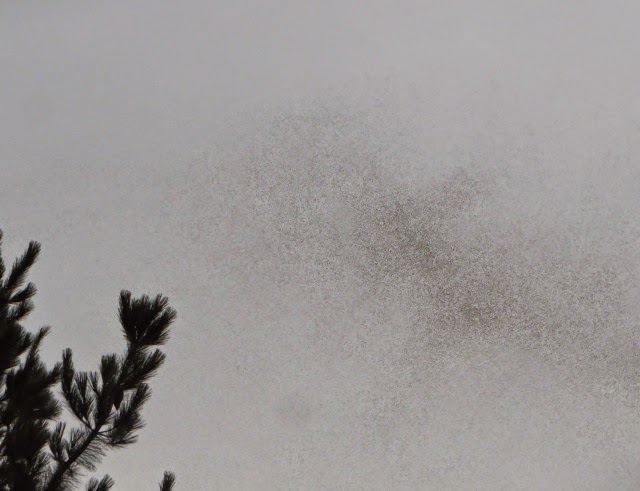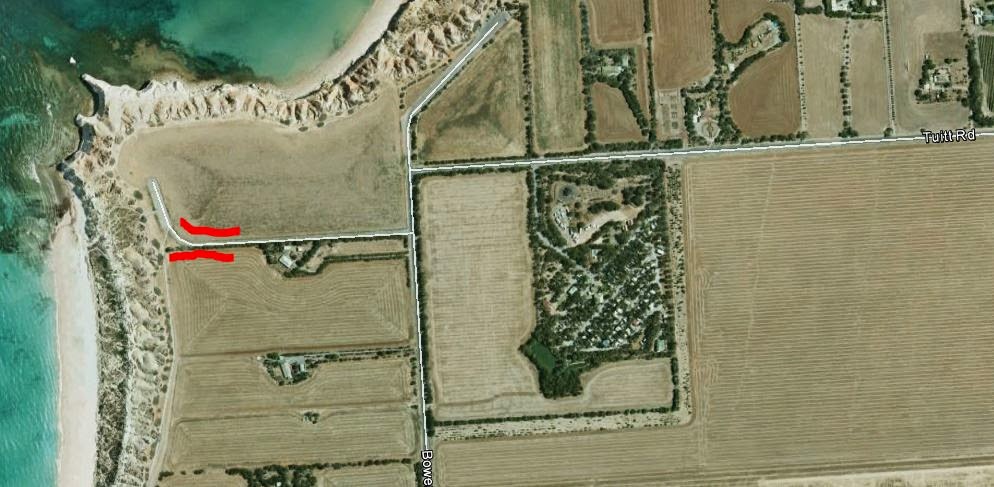Hanrahan the hero of East Gippsland.
The gentleman referred to in the title is a farmer, remembered for never being happy with the current weather.
Indeed, so it turned out later in the day, as shown in this postcard shot.
What the postcard doesn't show is the strong Westerly wind. That did have the side benefit of creating unusual patterns on the beach in the lee of shells and small stones.
By the time we got home the weather had improved from “spitting” to “threatening to spit” so we took ourselves off to the Shipwreck Creek track to find some flowers and/or birds. At first this seemed a rather desperate endeavour, especially since just as we started to find some blossom the weather (which had gone sideways to “ominous”) got worse, achieving ‘light shower’ status. Of
course when we got back to the car spitting status had been re-attained so we
set off to see what could be seen. The
initial answer was “not much beyond bracken and eucalypts”. However we then got a technique of stopping
for a snuffle as soon as we saw some flowers - mainly where the bracken was not growing right out to the road - and found a lot of interesting
things.
We went for a walk along a track outside the airport fence. I was a bit perplexed why Tammie suddenly yelped and moved back on the track as she is not a dog who yelps much. Then I realised that she had just learnt about electric fences as wombat deterrents!
Enough of this text let us get into the pictures of flowers that I think we can identify. (Those which I cannot take a guess at have their own page: in either case suggestions for names are welcomed.) Note that where 'sp.' appears I am not completely confident of the species and those with sp and no species name mean I have settled happily at the genus level!
Dampiera sp.
Billardiera scandens
Goodenia sp. ovata
Viminaria juncea (one of the very few beans we saw flowering).
Senecio linearifolius. The common name of this species refers to 'groundsel' which I recall as a very short and prolific weed in English gardens of my childhood.
Olearia sp
Melaleuca sp. ericifolia
Dianella sp.
Kunzea ericoides
Lobelia sp
Pimelia sp
Patersonia sp
Euphorbia paralias It was growing in a littoral sand dune so the vernacular name of "sea spurge" is appropriate.
So were Satin Bowerbirds. From the colour of the throat I think this is a female.
A Silver Gull came to visit the railing.
I think the camera did a fair job of focusing to enable this clip of the eye!
The day
dawned with cloud. However I was aware
that we were in Mexico (ie South of the Border) and knew that we still had to
least 3 seasons to fit in to the rest of
the day. One of them at least should be
pleasant!
Indeed, so it turned out later in the day, as shown in this postcard shot.
What the postcard doesn't show is the strong Westerly wind. That did have the side benefit of creating unusual patterns on the beach in the lee of shells and small stones.
Although not in NSW I couldn't resist this snap of the Mallacoota War Memorial. Its a pity that the central plaque refers to Bruce Ruxton - one of my least favourite people.
Getting back into the chronology, the improvement depicted above hadn’t happened by the time we took Tammie for a walk up the Bowerbird infested road. That meant we beat a retreat as the sky was spitting at us. I suspect that there is a PhD in linguistics to be obtained for listing all the language Victorians have for wet weather.
We went for a walk along a track outside the airport fence. I was a bit perplexed why Tammie suddenly yelped and moved back on the track as she is not a dog who yelps much. Then I realised that she had just learnt about electric fences as wombat deterrents!
Enough of this text let us get into the pictures of flowers that I think we can identify. (Those which I cannot take a guess at have their own page: in either case suggestions for names are welcomed.) Note that where 'sp.' appears I am not completely confident of the species and those with sp and no species name mean I have settled happily at the genus level!
Dampiera sp.
Billardiera scandens
Goodenia sp. ovata
Viminaria juncea (one of the very few beans we saw flowering).
Senecio linearifolius. The common name of this species refers to 'groundsel' which I recall as a very short and prolific weed in English gardens of my childhood.
Olearia sp
Melaleuca sp. ericifolia
Dianella sp.
Kunzea ericoides
Lobelia sp
Pimelia sp
Patersonia sp
Euphorbia paralias It was growing in a littoral sand dune so the vernacular name of "sea spurge" is appropriate.
After lunch the
weather improved from a hailstorm (having visited “sounds like thunder nearby” en route) to “strong wind before rain” although our wearing of raincoats
deferred the rain! WE went for a stroll
around Bastion Point where we saw the last species.
Birds were few and far between on the beach. Although we added 6 species to the trip list
they were all birds in 1s and 2s.
Perhaps the gale had driven them off?
Little Wattlebirds were common visitors to the house.
So were Satin Bowerbirds. From the colour of the throat I think this is a female.
A Silver Gull came to visit the railing.
I think the camera did a fair job of focusing to enable this clip of the eye!
The possum situation of the previous evening/night re-emerged and is described in its own post.
Here are links to other parts of this saga:


























Comments